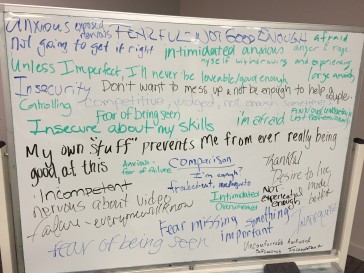
by Raindrop Administrator | Jan 8, 2016 | Anxiety, Emotions
Accepting Your Anxiety
Accepting that you get anxious can feel like you are surrendering to something awful. I encourage you to congratulate yourself because it’s not easy to recognize anxiety! In fact our anxiety often manifests itself in many different ways. For example many people believe that they are having a heart attack and end up in the local ER. Others focus on the external things, “If I just had a clean house I wouldn’t feel this way” or “If I just had a new job I’d be better.” Yet despite making many changes, we end up with the same symptoms reappearing over time. Finally we figure out that it’s our body that is undergoing a stress response.
So, seeing your anxiety and accepting that it’s something happening inside of you, that causes you to go into a fight and flight response, is a big first step!

Understanding Your Anxiety
Great! Now what? And it’s not all bad news. Identifying the problem is half the solution! Because you can manage what you know and can make sense of. The other good news is that you are not alone. 16 million Americans suffer from anxiety. This is actually good news, because it lets you know just how common anxiety is, and also how researched it is. There is a lot that can be done.

So now that you know it’s there, let’s start figuring out what’s going on. And to do that, you need to observe, be willing to learn, and to track well. Start a journal and write down everything that you notice about your stress response.
How do you know it’s anxiety? What in your body and mind tell you that? Is it something you keep thinking about? Or is it the pain you feel in your chest? Write down every symptom that you can. For a list of common symptoms, stay tuned; I will be covering this later this month.
Now start tracking these symptoms. Notice when they arise, and the intensity of the symptom. After collecting evidence for a couple days, what patterns have you noticed? Is your anxiety worse in the morning or afternoon? Does it present on a Monday morning after the weekend on your way back to work? Is it worse after you’ve eaten a certain food, or after you’ve been thinking about your deceased loved one? There is always a pattern, and there is always a reason. Start looking for this!
Managing Your Anxiety
Once you recognize you are anxious, your job is practice coping skills that will stop your fight-flight response and initiate a calming response. There are many different ways to do this. These include physiological ways, through deep breathing. Another way is to do exercise or progressive muscle relaxation, systematically tightening and relaxing your muscles. Make sure you are hydrated and stay away from caffeine, which aggravates anxiety. On a thought level, you are going to start to notice anxious thinking, and actively change the way you think. This will change the way you feel. Finally you are going to understand why your system has sent you anxiety, and understand what it is that your body is needing. Once you understand the root cause, and can take care of yourself in a different way, the anxiety won’t be necessary anymore.


by Raindrop Administrator | Nov 3, 2015 | Emotions, Family Therapy
I’m so excited about this month of social media. I’ve decided that for me, it’s going to be a month of play. It’s November, Halloween just got us in the mood and there are more holidays lined up for the next 2 months that at any other time of year. Let’s get in the mood for play, and not feel bad about it. Because Play is good for you, your loved ones will love it, and it will be therapeutic for you.

- You need Play
Do you play? If you were given a couple hours to have fun, what is it you would do? Imagine yourself doing that now. Really put yourself there. How does it feel? What do you notice about your body? We need rest, we need to smile, we need to stop worrying, and play does all of this for us. Getting us into that place of relaxation allows us to work more productively, think more clearly and be more intentional about our relationships.

- Play with your kids
Some people find it easy to play with their kids, others really want to but don’t know how to do this. I want to encourage you not to make it harder than it needs to be. You don’t need to play like other parents play. Figure out what you enjoy doing, and find a way to play at that with your child. If it’s sport, then play sport. If it’s baking, then let them put the sprinkles on the cupcakes or learn how to break eggs. If you can’t think of what to do, play hide and seek or rough and tumble on the ground. These two classic games are always favourites. Know that even when you put a couple minutes a day into some sort of playful time with your kids, you are building your relationship with them. There are 3 things that are most important to kids – fun, games and play. When you join them in this, you are speaking their language, their hearts will open and you will grow closer.
- Play is therapeutic
Play is good for us on many different levels. Actually it’s essential for healthy development. Play benefits the brain. Frost first spoke about this in 1998, saying, “during the first years of life, it is playful activity, not direct instruction, seclusion, deprivation, or abuse that makes a positive difference in brain development and subsequent human functioning”. He goes on to quote Nash (1997) who reported from research at Baylor College of Medicine that “…children who don’t play much or are rarely touched develop brains 20% to 30% smaller than normal for their age”.

Play helps us to develop social skills. I smiled a couple days ago as I listened to my 5 yr old daughter play in her room with 2 neighbors. She was being her bossy self, and her friends called her out for being bossy. I considered going in to enforce the lesson, but after listening outside the door for awhile, I realized that they were doing a great job of working it out together as kids. It allowed her to see herself through the eyes of peers, and it gave them an opportunity to be assertive. In Japanese preschools, the custom is to allow children to work out their own difficulties and not to step in unless necessary. This gives children a change to engage in conflict, and also learn how to negotiate and learn cooperation.

Have fun today. Find something to laugh about, someone to smile with, and something to live for.
Happy playing
References:
Frost, Joe L.
TITLE Neuroscience, Play, and Child Development.
PUB DATE 1998-06-00

by Raindrop Administrator | Sep 25, 2015 | Emotions, Therapy
It’s time to go to therapy!
I’m predicting that most of us have either considered starting therapy, or we have been on the receiving end of someone telling us to go. It can be so hard to go to therapy. Why is that?
We are scared to go and sit on a couch, and tell someone what we are dealing with. We are scared for various reasons:
1. Admitting I need therapy, is admitting there is something wrong with me
On the contrary, I think it takes guts and wisdom to see a therapist. Socrates encouraged us to “know thyself!” Getting to know yourself doesn’t take forever. There’s only one of you, and so you only have to get to know yourself once. Trust me, you’re not that complicated!
Contentment comes from having good balance. From knowing who you are and what your body needs. Once you care for yourself, you can function better. Your body will stop sending you symptoms when you understand the reason they exist.
The definition of insanity is to keep doing the same thing but to expect a different result. Going to therapy, is doing something different. It’s allowing an objective observer help you to understand yourself. They give you new perspective, and this leads to change.
I think that going to therapy is the ultimate gift for yourself. Someone listening to every word you have to say? You become the center of the universe for awhile, and we all have the need to be seen and to be heard.
2. Hearing I need to change, and that there is a problem, means I am failing on some level
Many of us would like to have a better relationship, and so therapy is proposed as a way to achieve this. We can’t make other people do things, we can’t make them change, and sometimes the more we ask them to come to therapy, the less inclined they are to listen.
I bet when you are beseeching someone to sign up for therapy, all they hear is that, “our relationship is in danger”, and, “I’m not good enough, I’m not making my spouse happy”. Any wonder they shutdown and won’t listen?
It’s true though. Success in getting someone to take your suggestion, does depend on the way you approach them. But I know it’s frustrating and sad for you, because this couldn’t be further from the truth. You are inviting them to go with you because you care about the relationship. You respect them and want to include them in the process. You are hoping for greater intimacy, longing for a better relationship.
Ask yourself whether your loved one is hearing criticism from you, or whether they are hearing your longing, your hopes and dreams for your relationship.
Before inviting them, ask yourself this question: If my relationship were all I wanted it to be right now, how would I be different? And then speak from this place. For example:
I’m experiencing a longing inside for greater connection, I think our relationship could benefit from this. I’d like to grow in this relationship, would you come with me so I can face my fears about trusting people? You’ve mentioned that you’d like me to change in some areas and I’m ready to explore these, I need your help to do this, would you come with me?
Lastly, if your loved one isn’t open to hearing about this from you, consider having someone else talk with them. Sometimes we need to hear the same thing, from a couple different people.
3. I will feel uncomfortable and the therapist will judge me.
Maybe you’re one of those people right now who can‘t think of anything worse than going to therapy, sitting on a couch in front of a stranger and telling them your life story. Worse, they will start to look at you in that knowing way, analyzing your life and asking you all manner of intrusive questions. What could be more uncomfortable, what could seem more inappropriate.
Therapists are trained not to judge. I also wouldn’t want to sit across from someone who analyzes me. Number 1 research says that therapy works when you feel safe and comfortable with your therapist. Remember that you’re not signing your life away. You can make a phone call to a therapist and see how you feel whilst talking with them. Many therapists are willing to meet with potential clients for 30min so that you can interview them. It’s important that you chose the right therapist for you, and of upmost importance that you feel safe and comfortable with them. You can be the judge of that!
4. The therapist will pity me and therapy won’t help
You don’t want a therapist who is going to sit and just listen to you. Therapy costs a lot of money, and you want to know it’s worthwhile. As therapists, we follow a model of treatment, and at anytime in treatment, we can tell you what we are doing, and why. We follow a 9 step model, and we all share an agreed upon goal. There are things you can implement between sessions that will help you achieve your goal. Ultimately the work in therapy will start to generalize into your life outside of the office. Change is a process, be prepared to give it a little time. I often ask clients to commit to 4-8 sessions of treatment, in order to start to benefit from some of the changes.
I hope you decide to give therapy a try. I have found it so worthwhile in my own life. I really hope that you can make the changes that you desire too.

by Raindrop Administrator | Nov 6, 2014 | Emotions, Family Therapy
Parents who spank their children, are scared of bringing their children to therapy, for fear that their therapist will report them for child abuse. This makes me so sad. I have had friends call me before seeing a family therapist, who need reassurance that they aren’t going to get reported to CPS. This leads me to wonder, how many families are living with this fear, and consequently missing out on family treatment?
The article, “The Myth of the Wooden Spoon,” by CAMFT Attorney David Jensen, provides information and reassurances that I found so insightful I felt compelled to bring it to your attention and summarize some of the key points.
From my parent perspective, as one who occasionally spanks my children, I also do not want to live in fear of being reported for abuse. In order to combat these potential fears, I believe it’s important to understand what the law says. California’s Child Abuse and Neglect Reporting Act (CANRA) describes what constitutes physical child abuse. As a clinician for many years, I am a mandated reporter for CANRA. My understanding was that when a spanking results in a bruise and/or when spanking takes place with an object – this constitutes abuse. Well, it’s not that simple. For that I am thankful.
There was a case in the CA Court of Appeal in 2014, called Gonzalez v. Santa Clara County Department of Social Services that held that “a parental privilege to impose reasonable physical discipline upon a child” must be considered when child abuse is being considered. As Jensen well summarizes, “a spanking does not constitute Child Abuse.” (p.42)
According to Gonzalez there is a difference between reasonable parental discipline and unreasonable criminal discipline. So what is the difference:
- Is there a genuine motive for the spanking? A carefully considered spanking to bring your child back to obedience, is very different than an impulsive punishment that is terrorizing and intimidating for a child. Criminal spankings are often happening in homes where there is also other violence happening.
- Is there a reasonable occasion for the spanking? Did the child do something that warrants a spanking? Is the child displaying serious enough behavioral symptoms and have you tried other strategies to deal with the behavior?
- Is the spanking reasonable in kind and degree? What you want to consider here is what the age of the child is, the part of the body you are spanking on, the object you are using to spank, and the type of damage and injuries the child sustains.
As a parent, ask yourself the following questions:
- Are you eager to spank your child?
- Do you derive self-gratification from spanking your child?
- Is spanking the only form of discipline you use?
- Do you feel out of control when you spank?
- Do you spank regardless of what the situation may warrant?
If the answer to any of these questions is yes, consider getting some support for yourself. You can work on your own emotional triggers and broaden your resources so that you can be a responsible and accessible parent to your children. Give me a call: 619 352 0054
Reference: The Myth of the Wooden Spoon, CAMFT magazine, September/October 2014, p 41 – 44.
Image via FPG / Retrofile / Getty Images

by Raindrop Administrator | Nov 9, 2013 | Couples in Therapy, Emotions, Therapy
How Emotionally mature do you consider yourself to be?
PROVE IT! Answer these questions:
IS THIS TRUE:
I notice an emotion when it shows up/ I know when I am feeling something
I use my feelings to motivate action
I see my impact on others
I think about how others view my responses
When I decide what to do, I am aware of how it will effect my relationships
OR IS THIS TRUE:
My partner understands my emotion better than I do
My emotions often gets the better of me in arguments
My emotions are so strong that they are overwhelming
I often react rather than respond to my partner
I don’t have clue why my partner reacts so strongly to what I say or do
I don’t know what I feel
I don’t know why my arguments end in a worse place than where they started
Achieving emotional awareness can be a challenging but beneficial aspect of relationships. Consider working on your emotional awareness and maturity. Doing so should give you greater satisfaction and flexibility in your relationships!
Except from EFT for Dummies, Bradley and Furrow, 2013
Image via http://www.interchanges.com/emotional-maturity-success-hack/

by Raindrop Administrator | Jul 22, 2009 | Emotions, Therapy
A young woman said something so profound to me today. She told me that what she loves about therapy is that the therapist doesn’t know any of her friends or colleagues. This allows her to talk about her life and her experiences freely. If the therapist had known her environment, then she would have felt like she was “gossiping”.
You see the difference is that you don’t just come to therapy to gossip or talk for the sake of talking. You come to talk so that you can learn about yourself, your responses and so that you can work on ways to change. So you are probably not gossiping when you’re in therapy, and if you are – find a friend instead and stop paying the therapist 🙂













